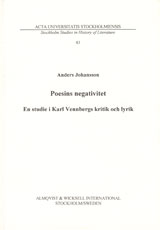
Poesins negativitet En studie i Karl Vennbergs kritik och lyrik
The aim of this dissertation is to investigate the theoretical views underlying Karl Vennberg's literary criticism, and then to use these views as a starting point for a study of his poetry. Thus, the book is largely divided into two parts. The first deals with Vennberg's reviews and essays, the second with his poetry. As a critic and a modernist poet, Vennberg defends the autonomy of literature, but not from the organicist or aestheticising viewpoint common to post-romantic poetics. Instead, he brings to the fore another part of the heritage from romantic literary theory: the view of literature as ironic, critical and endlessly open. In his concept of irony as an endlessly ambiguous negativity, we encounter an understanding of literature that permeates all of his work. Poetry is, thus, defined by him as a freedom in relation to everything decided - a critical, destructive force that questions ingrained ideas, concepts and ideologies in the name of nothing more than negation. This theoretical stand also characterises Vennberg's relation to mysticism. He obviously feels affiliated to it's negative, critical side, it's via negativa, but does not accept the dialectics through which it reappropriates negativity into religious belief. The final part of the dissertation consists of close readings of specific poems, brought into relief by the theoretical context found in Vennberg's critical writings.
Utgiven: 2000
ISBN: 9789122018650
Förlag: Acta Universitatis Stockholmiensis
Format: Häftad
Språk: Svenska
Sidor: 260 st
The aim of this dissertation is to investigate the theoretical views underlying Karl Vennberg's literary criticism, and then to use these views as a starting point for a study of his poetry. Thus, the book is largely divided into two parts. The first deals with Vennberg's reviews and essays, the second with his poetry. As a critic and a modernist poet, Vennberg defends the autonomy of literature, but not from the organicist or aestheticising viewpoint common to post-romantic poetics. Instead, he brings to the fore another part of the heritage from romantic literary theory: the view of literature as ironic, critical and endlessly open. In his concept of irony as an endlessly ambiguous negativity, we encounter an understanding of literature that permeates all of his work. Poetry is, thus, defined by him as a freedom in relation to everything decided - a critical, destructive force that questions ingrained ideas, concepts and ideologies in the name of nothing more than negation. This theoretical stand also characterises Vennberg's relation to mysticism. He obviously feels affiliated to it's negative, critical side, it's via negativa, but does not accept the dialectics through which it reappropriates negativity into religious belief. The final part of the dissertation consists of close readings of specific poems, brought into relief by the theoretical context found in Vennberg's critical writings.
Begagnad bok (0 st)
Varje vecka tillkommer tusentals nya säljare. Bevaka boken så får du meddelande när den finns tillgänglig igen.



